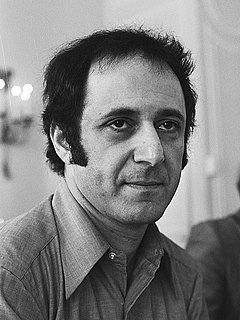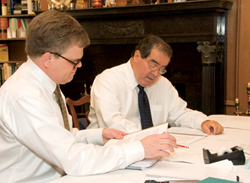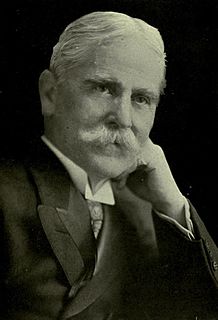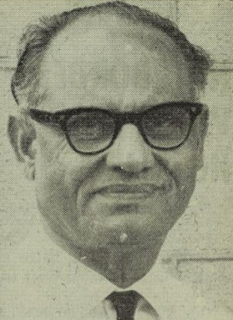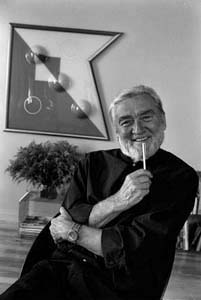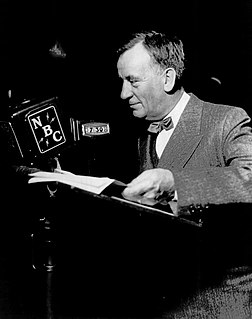Top 226 Dreary Quotes & Sayings - Page 4
Explore popular Dreary quotes.
Last updated on April 19, 2025.
I have always considered The Merry Wives one of the worst plays, if not altogether the worst, that Shakespeare has left us. The wit for the most part is dreary or foolish; the tone is coarse and farcical; and the characters want the fine distinctive touches he so well knew how to give. If some luckless wight had written such a comedy in our time, I should like to see what the critics would say to it?
The profession of shaman has many advantages. It offers high status with a safe livelihood free of work in the dreary, sweaty sense. In most societies it offers legal privileges and immunities not granted to other men. But it is hard to see how a man who has been given a mandate from on High to spread tidings of joy to all mankind can be seriously interested in taking up a collection to pay his salary; it causes one to suspect that the shaman is on the moral level of any other con man. But it is a lovely work if you can stomach it.
It's very important for any artist, in any field, to take their own temperature and check out their own energy, and see what it is they ought to be doing to keep the energy up. Because if your energy is not up, you're going to come up with some really dreary piece of work that no one's going to enjoy.
The drab brown front of the house made it look as if it had been built from rusty spare parts. Someone always put lace curtains in the windows of dreary houses, and Nick was unsurprised to see the curtains making their attempts in every window of this place. There was a china garden gnome on the doorstep, wearing a desperate, crazy smile. "It's not so bad," Alan said. "You never take me nice places anymore, baby." said Nick, and was mildly gratified by Alan's ring of laughter, like a living bell that had been caught by surprise when it was struck.
God of our life, there are days when the burdens we carry chafe our shoulders and weigh us down; when the road seems dreary and endless, the skies gray and threatening; when our lives have no music in them, and our hearts are lonely, and our souls have lost their courage. Flood the path with light, run our eyes to where the skies are full of promise; tune our hearts to brave music; give us the sense of comradeship with heroes and saints of every age; and so quicken our spirits that we may be able to encourage the souls of all who journey with us on the road of life, to your honor and glory.
At this time, we should renew our faith in God. We celebrate the hour in which God came to man. It is fitting that we should turn to Him. . . But there are many others who are away from their homes and their loved ones on this day. Thousands of our boys are on the cold and dreary battlefield of Korea. But all of us, at home, at war, wherever we may be, are within reach of God's love and power. We can all pray. We should all pray.
There are houses in certain provincial towns whose aspect inspires melancholy, akin to that called forth by sombre cloisters, dreary moorlands, or the desolation of ruins. Within these houses there is, perhaps, the silence of the cloister, the barrenness of moors, the skeleton of ruins; life and movement are so stagnant there that a stranger might think them uninhabited, were it not that he encounters suddenly the pale, cold glance of a motionless person, whose half-monastic face peers beyond the window-casing at the sound of an unaccustomed step.
The clean clear colours were in my head. But one day as I looked at the brown burned wood of the Shanty, I thought 'I can paint one of those dismal-coloured paintings like the men. I think just for fun I will try - all low-toned and dreary with the tree besides the door.' In my next show, 'The Shanty' went up. The men seemed to approve of it. They seemed to think that maybe I was beginning to paint. That was my only low-toned dismal-coloured painting.
Nothing is very strong: strong enough to steal away a man's best years not in sweet sins but in a dreary flickering of the mind over it knows not what and knows not why, in the gratification of curiosities so feeble that the man is only half aware of them, in drumming of fingers and kicking of heels, in whistling tunes that he does not like, or in the long, dim labyrinth of reveries that have not even lust or ambition to give them a relish, but which, once chance association has started them, the creature is took weak and fuddled to shake off.
... I had a latent impression that there was something decidedly fine in Mr. Wopsle's elocution - not for old associations' sake, I am afraid, but because it was very slow, very dreary, very up-hill and down-hill, and very unlike any way in which any man in any natural circumstances of life or death ever expressed himself about anything.
A word about 'plain English.' The phrase certainly shouldn't connote drab and dreary language. Actually, plain English is typically quite interesting to read. It's robust and direct-the opposite of gaudy, pretentious language. You achieve plain English when you use the simplest, most straightforward way of expressing an idea. You can still choose interesting words. But you'll avoid fancy ones that have everyday replacements meaning precisely the same thing.
Thou wayfaring Jesus - a pilgrim and stranger, Exiled from heaven by love at Thy birth: Exiled again from Thy rest in the manger, A fugitive child 'mid the perils of earth - Cheer with Thy fellowship all who are weary, Wandering far from the land that they love: Guide every heart that is homeless and dreary, Safe to its home in Thy presence above.
Why had we let it go? Why had we both been condemned...to an exile among dreary strangers who had made us give up all desire for rest, for friendship, for the sound of human voices? Could I now reclaim a single hour spent talking to my brother, Philip, and give it to Ken Daggart? Who made it our duty to accept, as the only reward for our work, the gray torture of pretending love for those who roused nothing but contempt?
There is more than one way to burn a book. And the world is full of people running about with lit matches. Every minority, be it Baptist/Unitarian, Irish/Italian/Octogenarian/Zen Buddhist, Zionist/Seventh-day Adventist, Women's Lib/Republican, Mattachine/FourSquareGospel feels it has the will, the right, the duty to douse the kerosene, light the fuse. Every dimwit editor who sees himself as the source of all dreary blanc-mange plain porridge unleavened literature, licks his guillotine and eyes the neck of any author who dares to speak above a whisper or write above a nursery rhyme.
Michelle Alexander's brave and bold new book paints a haunting picture in which dreary felon garb, post-prison joblessness, and loss of voting rights now do the stigmatizing work once done by colored-only water fountains and legally segregated schools. With dazzling candor, Alexander argues that we all pay the cost of the new Jim Crow.
The Three Wiseman: The weather has been awful, The countryside is dreary, Marsh, jungle, rock; and echoes mock, Calling our hope unlawful; But a silly song can help along Yours ever and sincerely: At least we know for certain that we are three old sinners, that this journey is much too long, that we want our dinners, and miss our wives, our books, our dogs, but have only the vaguest idea why we are what we are. To discover how to be human now Is the reason we follow this star.
Let us, then, fellow citizens, unite with one heart and one mind. Let us restore to social intercourse that harmony and affection without which liberty and even life itself are but dreary things. And let us reflect that having banished from our land that religious intolerance under which mankind so long bled, we have yet gained little if we counternance a political intolerance as despotic, as wicked, and capable of a bitter and bloody persecutions.
If European symbols and traditions have grown tired, perfunctory and oppressively banal in Australia, or been drained of spirit and meaning by the dreary dictates of materialism and secularity, then the raw spirit truth of our native land is alive and radiant by comparison. For joy and meaning we might well turn to our natural country and witness miracles of vitality and new life, of inspiration and profound beauty; all in some humble, quiet and improbable place.
For all our penny-wisdom, for all our soul-destroying slavery to habit, it is not to be doubted that all men have sublime thoughts; that all men value the few real hours of life; they love to be heard; they love to be caught up into the vision of principles. We mark with light in the memory the few interviews we have had, in the dreary years of routine and of sin, with souls that made our souls wiser; that spoke what we thought; that told us what we knew; that gave us leave to be what we only were.
Our moods do not believe in each other. To-day I am full of thoughts, and can write what I please. I see no reason why I should not have the same thought, the same power of expression, to-morrow. What I write, whilst I write it, seems the most natural thing in the world; but yesterday I saw a dreary vacuity in this direction in which now I see so much; and a month hence, I doubt not, I shall wonder who he was that wrote so many continuous pages. Alas for this infirm faith, this will not strenuous, this vast ebb of a vast flow! I am God in nature; I am a weed by the wall.
I am, I must confess, suspicious of those who denounce others for having too much sex. At what point does a healthy amount become too much? There are, of course, those who suffer because their desire for sex has become compulsive; in their case the drive (loneliness, guilt) is at fault, not the activity as such. When morality is discussed I invariably discover, halfway into the conversation, that what is meant are not the great ethical questions but the rather dreary business of sexual habit, which to my mind is an aesthetic rather than an ethical issue.
When I was in college, I remember fearing that the dreary grind of adulthood would feature infinitely more existential dread than frat parties had, but the opposite has been true for me. I'm much less likely to feel that gnawing fear of aimlessness and nihilism than I used to be and that's partly because education gave me job opportunities, but it's mostly because education gave me perspective and context.
Renounce and give up. What did Christ say? "He that loseth his life for my sake shall find it." Again and again did he preach renunciation as the only way to perfection. There comes a time when the mind awakes from this long and dreary dream-the child gives up its play and wants to go back to its mother. Renunciation is not asceticism. Are all beggars Christ? Poverty is not a synonym for holiness; often the reverse.
Your machinery is beautiful. Your society people have apologized to me for the envious ridicule with which your newspapers have referred to me. Your newspapers are comic but never amusing. Your Water Tower is a castellated monstrosity with pepperboxes stuck all over it. I am amazed that any people could so abuse Gothic art and make a structure not like a water tower but like a tower of a medieval castle. It should be torn down. It is a shame to spend so much money on buildings with such an unsatisfactory result. Your city looks positively dreary.
But 'why then publish?' There are no rewards Of fame or profit when the world grows weary. I ask in turn why do you play at cards? Why drink? Why read? To make some hour less dreary. It occupies me to turn back regards On what I've seen or pondered, sad or cheery, And what I write I cast upon the stream To swim or sink. I have had at least my dream.
Thus thought I, as by night I read Of the great army of the dead, The trenches cold and damp, The starved and frozen camp,-- The wounded from the battle-plain, In dreary hospitals of pain, The cheerless corridors, The cold and stony floors. Lo! in that house of misery A lady with a lamp I see Pass through the glimmering gloom And flit from room to room. And slow, as in a dream of bliss, The speechless sufferer turns to kiss Her shadow, as it falls Upon the darkening walls.
Little by little things began to assume a new aspect. The sense of insecurity vanished, words came of themselves, I was no longer so painfully conscious of everything I said. I drank on and felt the great soft wave approach and embrace me; the dark hour began to fill with pictures and stealthily the noiseless procession of dreams appeared again superimposed on the dreary, grey landscape of existence.
Looking at your life as a debt may seem the dreariest view of things at a distance; but it cannot really be so. What makes life dreary is the want of motive; but once beginning to act with the penitential, loving purpose you have in your mind, there will be unexpected satisfactions--there will be newly-opening needs--continually coming to carry you on from day to day. You will find your life growing like a plant.
This progressive effacement of human relationships is not without certain problems for the novel. How, in point of fact, would one handle the narration of those unbridled passions, stretching over many years, and at times making their effect felt on several generations? We’re a long way from Wuthering Heights, to say the least. The novel form is not conceived for depicting indifference or nothingness; a flatter, more terse, and dreary discourse would need to be invented.
In a musical sense, it seemed like all the good intentions had gone awry, very quickly. I mean, we got back from America and Blur had made The Great Escape, which I thought was a really, truly awful album - so cheesy, like a parody of Parklife, but without the balls or the intellect. And Oasis were enormous and I always found them incredibly dreary. There was this uncritical reverence surrounding the whole thing
There is a clear acknowledgement all over the world that we should not teach people to read and then to leave them without literature. For they would then relapse into a dreary and ultimately dangerous state of half-education, in which they would be easily satisfied by crude semi-pictorial approximations of the strip cartoon and by the abundant supply of degenerate literature which destroys, rather than promotes, a capacity to face the problems of the world with skill and courage
Once upon a midnight dreary, while I pondered weak and weary, O’er a plan to venge myself upon that cursed Thursday Next- This Eyre affair, so surprising, gives my soul such loath despising, Here I plot my temper rising, rising from my jail of text. “Get me out!” I said, advising, “Pluck me from this jail of text- or I swear I’ll wring your neck!
When our days become dreary with low hovering clouds of despair, and when our nights become darker than a thousand midnights, let us remember that there is a creative force in this universe, working to pull down the gigantic mountains of evil, a power that is able to make a way out of no way and transform dark yesterdays into bright tomorrows. Let us realize the arc of the moral universe is long but it bends toward justice.
We know better than to think that Republicans can win only on the failures of Democrats. It still comes down to a contest of ideas, which is really good news, ladies and gentlemen, because when it's about ideas, the advantage goes to us. Against their dreary backdrop of arrogant bureaucracies, pointless mandates, reckless borrowing, willful retreat from the world and all that progressives have in store for us, the Republican Party stands as a great enduring alternative party.
Art has to be a kind of confession. I don't mean a true confession in the sense of that dreary magazine. The effort it seems to me, is: if you can examine and face your life, you can discover the terms with which you are connected to other lives, and they can discover them, too - the terms with which they are connected to other people.
I can honestly say that there are many forms of atheism that I find far more admirable than many forms of Christianity or of religion in general. But atheism that consists entirely in vacuous arguments afloat on oceans of historical ignorance, made turbulent by storms of strident self-righteousness, is as contemptible as any other form of dreary fundamentalism. And it is sometimes difficult, frankly, to be perfectly generous in one’s response to the sort of invective currently fashionable among the devoutly undevout, or to the sort of historical misrepresentations it typically involves.
The main purpose of my work is to provoke people into using their imagination. Most people spend their lives in dreary, grey-beige conformity, mortally afraid of using colours. By experimenting with lighting, colours, textiles and furniture and utilizing the latest technologies, I try to show new ways to encourage people to use their phantasy and make their surroundings more exciting.
Once upon a midnight dreary, while I pondered, weak and weary, Over many a quaint and curious volume of forgotten lore--While I nodded, nearly napping, suddenly there came a tapping, As if some one gently rapping, rapping at my chamber door. "'Tis some visitor," I muttered, "tapping at my chamber door--Only this and nothing more.
During the whole of a dull, dark, and soundless day in the autumn of the year, when the clouds hung oppressively low in the heavens, I had been passing alone, on horseback, through a singularly dreary tract of country; and at length found myself, as the shades of the evening drew on, within view of the melancholy House of Usher. I know not how it was - but, with the first glimpse of the building, a sense of insufferable gloom pervaded my spirit.
When the world is mad, a mathematician may find in mathematics an incomparable anodyne. For mathematics is, of all the arts and sciences, the most austere and the most remote, and a mathematician should be of all men the one who can most easily take refuge where, as Bertrand Russell says, "one at least of our nobler impulses can best escape from the dreary exile of the actual world."
There's nothing that builds up a toil-weary soul
Like a day on a stream,
Back on the banks of the old fishing hole
Where a fellow can dream.
There's nothing so good for a man as to flee
From the city and lie
Full length in the shade of a whispering tree
And gaze at the sky.
. . . .
It is good for the world that men hunger to go
To the banks of a stream,
And weary of sham and of pomp and of show
They have somewhere to dream.
For this life would be dreary and sordid and base
Did they not now and then
Seek refreshment and calm in God's wide, open space
And come back to be men.
Whenever I hear some bigmouth in Washington or the Christian heartland banging on about the evils of sodomy or whatever, I mentally enter his name in my notebook and contentedly set my watch. Sooner rather than later, he will be discovered down on his weary and well-worn old knees in some dreary motel or latrine, with an expired Visa card, having tried to pay well over the odds to be peed upon by some Apache transvestite.
. . .this prayer I make, Knowing that Nature never did betray The heart that loved her; 't is her privilege, Through all the years of this our life, to lead From joy to joy: for she can so inform The mind that is within us, so impress With quietness and beauty, and so feed With lofty thoughts, that neither evil tongues, Rash judgments, nor the sneers of selfish men, Nor greetings where no kindness is, nor all The dreary intercourse of daily life, Shall e'er prevail against us, or disturb Our cheerful faith, that all which we behold Is full of blessings.
The hardest lesson is Clare’s solitude. Sometimes I come home and Clare seems kind of irritated; I’ve interrupted some train of thought, broken into the dreary silence of her day. Sometimes I see an expression on Clare’s face that is like a closed door. She has gone inside the room of her mind and is sitting there knitting or something. I’ve discovered that Clare likes to be alone. But when I return from time traveling she is always relieved to see me.
Where the mind is without fear and the head is held high, where knowledge is free. Where the world has not been broken up into fragments by narrow domestic walls. Where words come out from the depth of truth, where tireless striving stretches its arms toward perfection. Where the clear stream of reason has not lost it's way into the dreary desert sand of dead habit. Where the mind is led forward by thee into ever widening thought and action. In to that heaven of freedom, my father, LET MY COUNTRY AWAKE!
Freedom is not a reward or a decoration that you toast in champagne. On the contrary, it's hard graft and a long-distance run, all alone, very exhausting. Alone in a dreary room, alone in the dock before the judges, and alone to make up your mind, before yourself and before the judgement of others. At the end of every freedom there is a sentence, which is why freedom is too heavy to bear.


